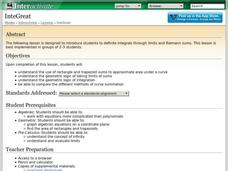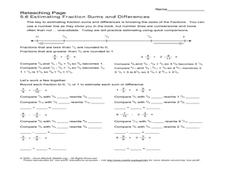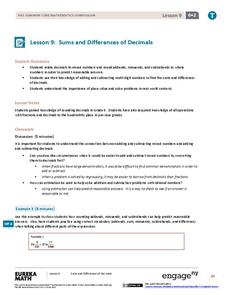Scholastic
Study Jams! Estimate Sums & Differences of Whole Numbers
Estimating is an essential skill used in everyday life. This presentation explains how to apply prior knowledge about rounding numbers to estimating sums and differences. Example problems and assessment include large numbers, making this...
Curated OER
Sums and Difference of Cubes
Learners factor polynomials using the sum and difference of cubes. They also learn connections between the graph and expression.
Hotchalk
Triangle Sum Theorem
Your visual geometry learners will appreciate triangle drawings as they model the triangle sum theorem and algebraically solve to find the missing interior angle in a triangle. Practice problems increase in complexity and vary in their...
Shodor Education Foundation
InteGreat
Hands-on investigation of Riemann sums becomes possible without intensive arithmetic gymnastics with this interactive lesson plan. Learners manipulate online graphing tools to develop and test theories about right, left, and midpoint...
Charleston School District
The Sum of Angles in a Triangle
An informative lesson contains a brief explanation of how the sum of the angles of a triangle is a line. The lesson continues with determining the missing angle in a triangle, or solving for a variable. Using the sum of the angles, the...
Curated OER
A Sum of Functions
Collaborative learners will see the geometric addition of functions by graphing the sum of two graphed curves on the same coordinate plane. This task then naturally flows into giving learners the algebraic representation of the curves...
Illustrative Mathematics
Sum of Angles in a Polygon
How can learners use algebra to solve a geometry problem? Help learners create an equation that shows the relationship between the number of sides of a polygon and the sum of the interior angles. Students are asked to divide the...
Curated OER
Using Addends and Sum/Using Subtrahend, Minuend, and Difference
What is an addend? What is a sum? Review this math terminology on the top half of the worksheet before practicing basic addition.
Curated OER
Estimating Fractions and Sums
What is a quick comparison, and how can it help you estimate sums and differences? For this estimation instructional activity, learners estimate fractions in addition problems. They complete four problems where they estimate the sums...
Curated OER
Estimating Sums and Differences
Work on rounding, estimating, adding, and subtracting with a helpful math instructional activity! Fifth graders study different sets of addition and subtraction problems, and after rounding each number to the leading digit, they estimate...
Curated OER
Equal Sums
Make addition a game! As learners become more familiar with addition, they can incorporate this equal sums matching activity into their practice time. The materials (included) are twenty-four cards, each with a simple addition problem...
Curated OER
Find the Sums (Under 100)
All of these sums are under 100: learners practice with three types of addition problems, each with two equations. First, they add a double-digit and single-digit number. Then, scholars add two double-digit numbers, one being a multiple...
EngageNY
Angle Sum of a Triangle
Prove the Angle Sum Theorem of a triangle using parallel line and transversal angle relationships. Pupils create a triangle from parallel lines and transversals. They find angle measures to show that the angles of a triangle must total...
Willow Tree
Angle Sum Property of Triangles
All triangles have some things in common. Using these properties of triangles, learners find missing angle measures. Scholars use the Angle Sum Property and properties of special triangles throughout the lesson.
EngageNY
Sums and Differences of Decimals
Sometimes dealing with decimals is so much easier than dealing with fractions. The ninth lesson plan in a 21-part module has the class consider situations when it might be easier to add or subtract fractions by first converting to...
CK-12 Foundation
Sum Notation and Properties of Sigma: Cracking the Code
Help your class develop an understanding of sigma notation. Pupils match the sigma notation with the sums. Using the expanded sums, learners evaluate the summations. The scholars move on to prove a property of sums.
CK-12 Foundation
Sums of Finite Arithmetic Series: Triangular Numbers
Using a slider, scholars build triangular numbers and their associated rectangles and use the geometric display to find the pattern to determine the next triangular number. They then relate that number to the area of the rectangle to...
Bowland
Magic Sum Puzzle
Learners discover the magic in mathematics as they solve numerical puzzles involving magic sums. They then make a conjecture as to why no additional examples are possible based on an analysis of the puzzles.
Illustrative Mathematics
Comparing Sums of Unit Fractions
First, add each set of fractions with unlike denominators. Then, compare their sums with the symbols <, >, or =.
Flipped Math
Calculus AB/BC - Approximating Areas with Riemann Sums
There are several ways to estimate the area if the curve does not create nice geometric figures. The presenter introduces the idea of using areas of rectangles to estimate the area under the curve. Pupils use four types of Riemann Sums,...
Curated OER
Sums of angles in polygons
In this sums of angles in polygons instructional activity, 5th graders find the value of x which is the angle that is not given in a polygon. Students complete 4 problems.
CK-12 Foundation
Arithmetic Series Sums: Adding Arithmetic Sums
Sum up the shortcuts. The interactive allows pupils to discover a shortcut in finding a partial sum of an arithmetic series. Learners use the shortcut to find other sums and to verify the process.
CK-12 Foundation
Area Sums: Estimation with Rectangles
The more rectangles, the better the estimate. Using the interactive, pupils explore estimating the area under a curve using left-hand sums. Learners respond to challenge questions on how to get better estimates using the same technique.
Curated OER
Riemann Sums
Students calculate the area under a curve. In this calculus lesson, students use Riemann Sums to find the area under a curve. They apply the boundaries of intervals as they solve for each area.
Other popular searches
- Estimating Sums
- Estimating Number Sums
- Partial Sums
- Sums of 10
- Addition Partial Sums
- Sums of 8
- Sums to 5
- Estimating Sums Differences
- Calculating Sums
- Estimating Sums of Fractions
- Color by Sums
- Multiplication Sums

























